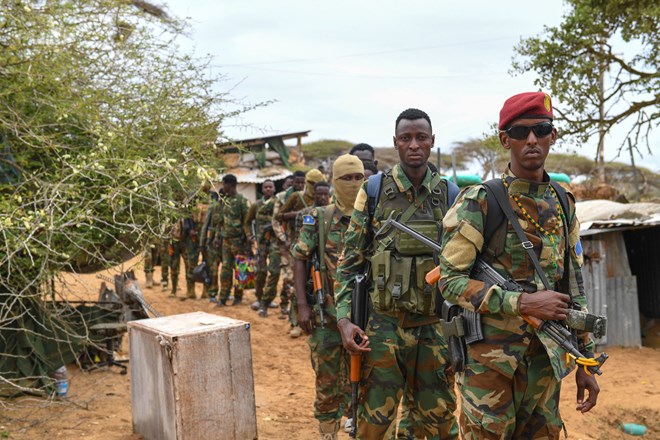
Friday October 4, 2024

Somali National Army (SNA) soldiers arrive to take over Albao Forward Operating base (FOB) in southwest Somalia after it was handed over by ATMIS Uganda Peoples Defense Forces (UPDF) on 27 June 2023. / ATMIS Photo / Fardosa Hussein
Mogadishu (HOL) — With just months until African Union forces exit Somalia, international allies are rushing to finalize plans for a new mission. The African Union Support and Stabilization Mission in Somalia (AUSSOM), slated to replace ATMIS by January 2025, is seen as critical to holding off Al-Shabaab, whose violent insurgency continues to threaten Somalia's stability.
The African Union Peace and Security Council has given the green light to the strategic Concept of Operations (CONOPs) for AUSSOM. The mission aims to bolster Somalia's security forces while ensuring the safety of African Union personnel on the ground. By prioritizing the training and equipping of local troops, the goal is for Somalia to maintain peace independently. However, the success of this mission hinges on continued international financial backing.
At a meeting in Washington, D.C., on Tuesday, representatives from the Somalia Quint Group—comprising the U.S., Qatar, Turkey, the UAE, and the UK—stressed the importance of securing both financial and logistical backing for AUSSOM. "Reaching an agreement on a post-ATMIS force is urgent," a senior U.S. official warned. Without adequate support, there is a real risk of a security vacuum that Al-Shabaab could exploit.Intelligence reports discussed by the group indicated that Al-Shabaab has gained access to advanced weaponry, including drones and missiles—likely through external sources.
Al-Shabaab, one of Africa's most resilient insurgent groups, has intensified its attacks. On August 2, a devastating suicide bombing and mass shooting at Mogadishu's Lido Beach killed 37 civilians, starkly demonstrating the group's ability to strike at the heart of the capital. Backed by international allies, the Somali government has intensified its military operations against Al-Shabaab. Yet, despite these efforts, the threat posed by the militant group remains significant.
"Al-Shabaab's asymmetric tactics highlight the need for continued external support," said Mohamed el-Amine Souef, the African Union's Special Representative for Somalia, during the UN Security Council briefing on Wednesday at the United Nations headquarters in New York.
Despite international partners pledging their support, the January deadline is fast approaching. The Quint group emphasized that securing financial backing for AUSSOM is vital to prevent a security vacuum. Any delay in funding or mission implementation could leave Somalia vulnerable to renewed insurgent offensives. A UK representative stressed this urgency, stating, "The Quint partners agree that financial backing for AUSSOM is crucial to prevent a repeat of chaotic security vacuums seen elsewhere in the region. Adequate funding is the cornerstone for Somalia's continued progress."
Somalia is entangled in shifting regional power dynamics. A newly signed defence pact with Egypt hints at a major geopolitical realignment. Cairo has pledged 5,000 troops to bolster Somalia's security under AUSSOM. The move is seen as Egypt's attempt to assert its influence in the Horn of Africa and push back against Ethiopia's expanding reach, particularly after Addis Ababa's controversial agreement to establish a naval base in Somaliland. Somalia has fiercely condemned the deal and interpreted it as a direct infringement on its sovereignty, further heightening tensions across an already fragile region.
James Swan, Acting Special Representative of the Secretary-General, highlighted during a UN Security Council briefing on Thursday that while the Somali Security Forces are taking over responsibilities from ATMIS, force generation remains a significant hurdle. Six of the eight designated forward operating bases have already been handed over to Somali control, but ensuring Somalia's long-term security will depend on continued international support.
Somalia's President Hassan Sheikh Mohamud has expressed confidence in the security forces' ability to manage the transition but has emphasized that continued international support is vital.
The Quint Group acknowledged that Somalia is making strides on the political front. In March 2024, the Somali Parliament amended four chapters of the Provisional Constitution, and the government is moving forward with plans for its first universal suffrage elections. By introducing reforms that enable one-person-one-vote elections, Somalia is taking critical steps toward stabilizing the country and building lasting democratic institutions.
However, these political advancements are precarious. Swan cautioned that without improved security, these milestones could be at risk. "Political progress is fragile and heavily reliant on the security situation," he told the UN Security Council. "There can be no democracy without stability."
After the Washington meeting, the Quint partners issued a joint statement reaffirming their commitment to Somalia's territorial integrity and unity.